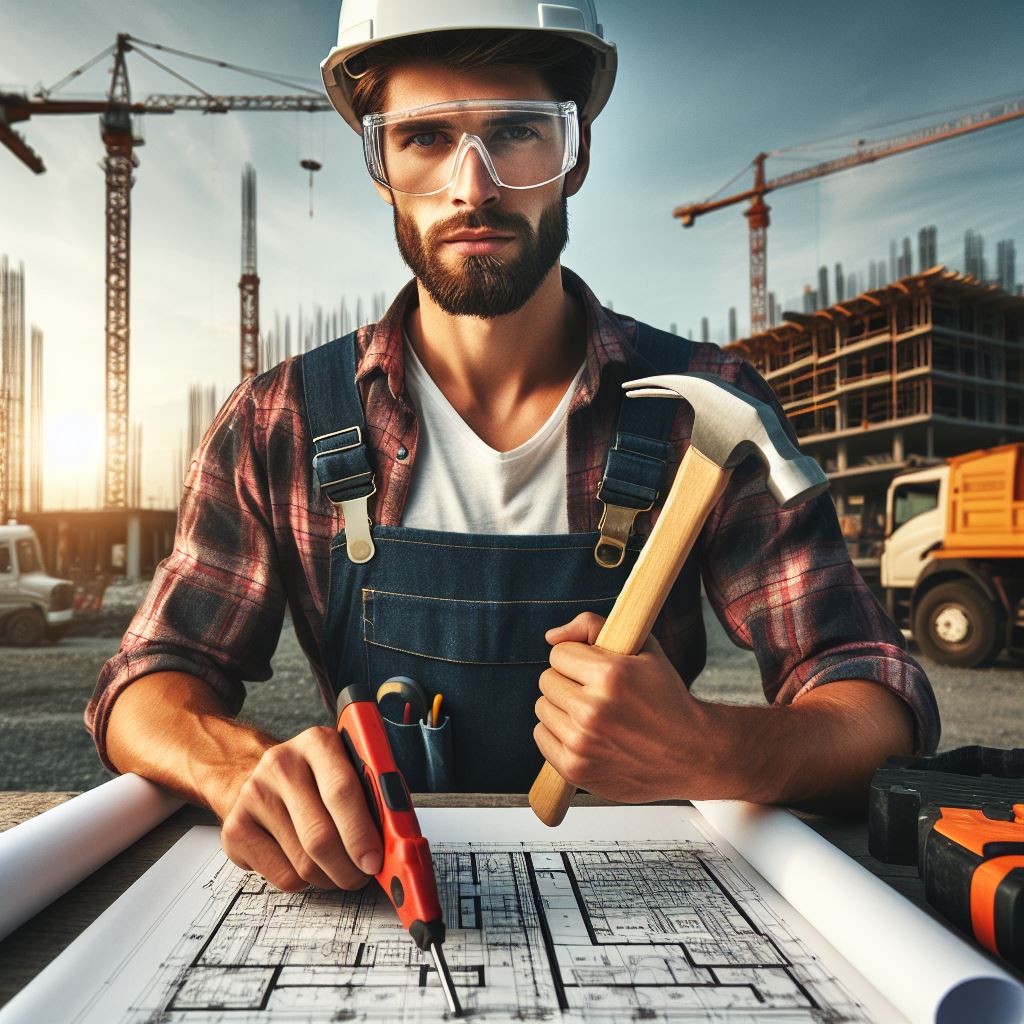Introduction
In the fast-evolving world of modern construction, the importance of essential skills for Aussie builders cannot be overstated.
As the industry undergoes transformative changes, builders find themselves at the intersection of tradition and innovation.
The construction landscape is no longer defined solely by bricks and mortar; it’s a dynamic arena where adaptability is as crucial as a solid foundation.
Technological advancements, from digital modeling to smart construction tools, have revolutionized traditional practices.
Aussie builders, once reliant on conventional methods, now embrace a spectrum of skills to stay ahead.
This section delves into the core competencies that define success for modern builders.
From mastering new tools to navigating intricate design software, these skills form the blueprint for crafting structures that stand as testaments to both strength and sophistication.
Join us as we unravel the fabric of essential skills shaping the journey of Aussie builders in the contemporary construction narrative.
Technical Skills
To succeed in the modern construction industry, Australian builders need diverse technical skills.
This includes reading blueprints, interpreting specifications, and understanding building codes.
Proficiency in using construction tools and equipment is essential, along with knowledge of different construction techniques.
Builders must grasp structural analysis for assessing building strength and stability.
Material selection, cost estimation, and effective project management are crucial aspects of their role.
Excellent communication skills are necessary for interaction with clients, architects, and construction teams.
Problem-solving abilities are vital to overcome unforeseen challenges.
Occupational health and safety knowledge ensures a safe working environment.
In summary, modern Aussie builders require a comprehensive skill set, encompassing technical proficiency, communication prowess, and problem-solving acumen to excel in the dynamic construction industry.
Problem-Solving and Critical Thinking
In the construction industry, problem-solving and critical thinking skills are highly relevant.
Builders need the ability to analyze challenges and find effective solutions to ensure successful projects.
Critical thinking can save time, money, and prevent potential risks in construction projects.
Importance of Problem-Solving and Critical Thinking
Problem-solving and critical thinking skills are essential for modern Aussie builders. In the construction industry, challenges are common and can arise from various factors such as design flaws, material shortages, budget constraints, or unexpected site conditions.
Builders need to be equipped with problem-solving skills to effectively analyze these challenges and find appropriate solutions. This involves thinking critically, evaluating options, and making informed decisions to keep projects on track.
Without strong problem-solving and critical thinking skills, builders may struggle to overcome obstacles efficiently. This can lead to delays, increased costs, and even compromised safety on construction sites.
Analyzing Challenges and Finding Effective Solutions
Builders must be able to analyze challenges in the construction industry to come up with optimal solutions.
When a problem arises, builders should examine all possible causes and consider potential solutions. This may involve consulting with experts, conducting research, or brainstorming with the project team.
By thinking critically, builders can identify the root cause of a challenge and devise strategies to address it effectively. This ensures that projects stay on schedule and meet quality standards.
How Critical Thinking Saves Time, Money, and Prevents Risks
Critical thinking skills can directly impact the success of construction projects and help builders avoid costly mistakes.
By applying critical thinking, builders can identify alternative methods or materials that may save time and money without compromising quality. This enables efficient resource allocation and cost-effective decision-making throughout the project.
Moreover, critical thinking allows builders to anticipate potential risks before they occur.
By carefully considering various factors, such as environmental conditions or site logistics, builders can implement proactive measures to prevent accidents, delays, or costly rework.
For example, a builder equipped with critical thinking skills may identify potential safety hazards in a construction design before it reaches the execution stage.
By addressing these issues early on, the builder can save both time and money by avoiding costly revisions or rework.
Your Personalized Career Strategy
Unlock your potential with tailored career consulting. Get clear, actionable steps designed for your success. Start now!
Get StartedProblem-solving and critical thinking skills are crucial for modern Aussie builders in the construction industry.
These skills enable builders to analyze challenges, find effective solutions, save time and money, and prevent potential risks.
With strong problem-solving abilities, builders can tackle construction projects more efficiently, ensuring timely completion and meeting the desired quality standards.
Communication and Collaboration
Importance of effective communication skills for builders working on a team
In the construction industry, effective communication skills are crucial for builders working on a team. Clear communication ensures that everyone is on the same page, leading to greater efficiency and productivity.
Builders must be able to articulate their ideas, plans, and concerns effectively to their team members. This ensures that everyone understands their role and responsibilities within the project, minimizing the risk of misunderstandings or mistakes.
The need to communicate clearly with clients, suppliers, and other professionals involved in the construction process
Builders also need to communicate clearly with clients. They must be able to explain technical concepts in a way that is easily understood by those who may not have a construction background.
Good communication with clients builds trust and helps manage expectations throughout the construction process.
Additionally, builders need to communicate with suppliers and other professionals involved in the construction process, such as architects, engineers, and subcontractors.
Clear communication ensures that all parties are aware of timelines, material requirements, and any potential issues that may arise. This collaboration helps prevent delays and promotes a smooth workflow.
Value of collaboration and being able to work well with others
Modern builders excel by mastering collaboration.
Working with diverse teams leverages specialized knowledge, fostering innovation and effective problem-solving.
Positive collaboration cultivates teamwork, camaraderie, and shared purpose, boosting morale and productivity.
Embracing technology enhances communication and collaboration efficiency.
Digital tools enable real-time discussions, streamline information exchange, and facilitate collaboration through shared platforms.
Project management software ensures transparency and accountability.
Effective communication is crucial for builders.
Clear communication with team members, clients, and suppliers enhances efficiency.
Collaboration is vital for success in the modern construction industry, and technology revolutionizes builders’ approaches to their work.
Read: A Day in the Life of an Aussie Plumber
Time and Project Management
In the fast-paced world of construction, time management skills are crucial for builders to ensure the timely completion of projects. Effective time management allows builders to meet deadlines and deliver high-quality work.
The Significance of Time Management Skills
Time management skills are essential for builders due to the nature of their work.
Construction projects often operate on tight schedules, and any delay can have significant repercussions. By managing their time effectively, builders can ensure that all tasks are completed on time.
Moreover, time management skills enable builders to allocate their resources efficiently.
With a well-structured schedule, builders can plan their work, allocate the necessary time for each task, and ensure that all resources are utilized effectively, leading to increased productivity.
Additionally, effective time management allows builders to handle unexpected issues that may arise during construction projects.
By having a clear understanding of their schedule and priorities, builders can easily adapt and make necessary adjustments without compromising deadlines.
Juggling Multiple Tasks and Prioritizing Work
Modern builders often find themselves juggling multiple tasks simultaneously. To effectively manage multiple tasks, builders need strong organizational skills and the ability to prioritize their work.
Stand Out with a Resume That Gets Results
Your career is worth more than a generic template. Let us craft a resume and cover letter that showcase your unique strengths and help you secure that dream job.
Get HiredBuilders must determine which tasks require immediate attention and prioritize accordingly. This involves understanding project timelines, client expectations, and the critical path of the project.
By prioritizing tasks, builders can ensure that essential elements of the project are not delayed.
Furthermore, builders need to be adaptable and flexible when managing multiple tasks. They should be able to switch between tasks seamlessly and efficiently without compromising the quality of their work.
Effective time management allows builders to handle various responsibilities without feeling overwhelmed or sacrificing project outcomes.
The Importance of Project Management Skills
Project management skills play a vital role in coordinating resources and ensuring efficiency throughout construction projects. Builders need strong project management skills to oversee the entire project from start to finish.
One crucial aspect of project management is resource coordination. Builders need to manage various resources such as materials, equipment, and personnel effectively.
This involves scheduling deliveries, organizing subcontractors, and ensuring that the right resources are available at the right time.
Moreover, project management skills help builders in maintaining efficient communication and collaboration among team members. Builders need to coordinate with architects, engineers, subcontractors, and clients to ensure that everyone is on the same page and working towards the same goals.
Additionally, project management skills enable builders to anticipate and mitigate potential risks and challenges. By carefully planning and monitoring the project, builders can identify potential issues and proactively address them, minimizing delays and ensuring the project stays on track.
In general, time management skills are vital for builders to ensure timely completion of projects. Builders must effectively juggle multiple tasks, prioritize work, and meet deadlines.
Project management skills are also crucial in coordinating resources and ensuring efficiency throughout the project. By honing these skills, builders can deliver high-quality work within the allocated time frame.
Read: The Future of Plumbing Tech in Australia

Explore Further: Landscaping ROI: What Aussies Should Know
Adaptability and Continuous Learning
Builders thrive in the modern construction industry by embracing adaptability.
Continuous learning is essential for staying updated with industry trends and technology.
Adaptable builders meet clients’ evolving needs and incorporate innovative solutions, like Building Information Modeling (BIM).
Embracing new materials and construction techniques ensures competitiveness.
Ongoing education through workshops and conferences enhances builders’ skills, keeping them at the forefront of industry practices.
Continuous learning is vital for maintaining licenses and certifications, ensuring builders’ success in the dynamic construction market.
In summary, adaptability and continuous learning are imperative for builders to excel in the ever-evolving construction industry, meeting client expectations and staying competitive in the market.
Read: A Day in the Life of an Aussie Plumber
See Related Content: Landscaping Tools: Must-Haves in Oz
Uncover the Details: Impact of Climate on Building in Australia
Health and Safety
Health and safety are crucial aspects of the construction industry, and modern Aussie builders need to possess essential skills in this area.
It is imperative that builders are aware of safety regulations and take necessary precautions to ensure a safe working environment for themselves and others on the construction site.
Transform Your LinkedIn for Maximum Impact
Elevate your professional brand with a LinkedIn profile that attracts recruiters, showcases your expertise, and maximizes opportunities. Stand out in your industry with a profile built for success.
Boost ProfileEssential Skills Related to Health and Safety in the Construction Industry
- Knowledge of Occupational Health and Safety (OH&S) regulations and laws.
- Ability to identify potential hazards and take appropriate preventive measures.
- Adequate training in emergency response and first aid procedures.
- Understanding the importance of personal protective equipment (PPE) and its correct usage.
- Effective communication skills to convey safety instructions to the team.
- Ability to conduct regular safety inspections and implement corrective measures where necessary.
Importance of Being Aware of Safety Regulations and Precautions
Builders must be well-informed about safety regulations and precautions to ensure compliance and protect themselves and other workers from potential hazards.
Failure to adhere to safety regulations can lead to accidents, injuries, and even fatalities on construction sites.
Clients also demand that builders follow strict safety guidelines, ensuring the welfare of everyone involved in a construction project.
By being aware of safety regulations, builders can avoid legal consequences and maintain a reputable image within the industry.
Maintaining a Safe Working Environment for Themselves and Others
Builders have a responsibility to create and uphold a safe working environment. This not only benefits themselves but also protects others, including subcontractors, workers, and visitors to the construction site.
A safe working environment reduces the likelihood of accidents and injuries, leading to increased productivity and smoother project execution. It fosters teamwork, morale, and establishes a positive work culture among the builders and the construction crew.
Additionally, maintaining a safe working environment demonstrates professionalism and dedication to quality work. It reassures clients that the builders prioritize their safety and the outcome of the project.
Key measures to maintain a safe working environment include
- Regular safety training sessions to educate the entire team on best practices and to address emerging risks.
- Maintaining clean and organized worksites to minimize tripping hazards and prevent accidents.
- Providing proper signage, warning systems, and safety equipment to mitigate workplace hazards.
- Implementing thorough risk assessment processes to identify potential hazards and develop appropriate control measures.
- Encouraging open communication among team members to address safety concerns or near-miss incidents.
Essentially, the construction industry demands that modern Aussie builders possess essential skills related to health and safety.
By being well-versed in safety regulations, builders can create and maintain a safe working environment, ensuring the well-being of themselves and others on the construction site.
Read: How to Become a Plumber in Australia
Delve into the Subject: Aussie Trends in Mechanical Engineering
Conclusion
This blog post has discussed the essential skills for modern Aussie builders, highlighting the importance of continuously developing these skills for success in the construction industry.
The essential skills mentioned include strong communication, problem-solving abilities, technical expertise, adaptability, and a commitment to lifelong learning.
It is crucial for builders to constantly update their knowledge and skills to keep up with the ever-evolving industry trends, regulations, and technologies.
By actively developing these skills, builders can improve their efficiency, productivity, and credibility, leading to increased career opportunities and professional growth.
Therefore, it is essential for builders to invest in ongoing education and training programs to stay competitive in the construction industry.
Continuously developing these skills will not only benefit the builders individually but also contribute to the overall growth and success of the construction industry in Australia.
As the industry continues to evolve, builders must embrace change, learn new skills, and adapt to emerging technologies to remain relevant and meet the needs of clients.
By doing so, they can position themselves as reliable and efficient professionals who consistently deliver high-quality work.
So, let us strive to become modern Aussie builders who are always eager to learn, grow, and excel in our craft, shaping a better future for the construction industry.




